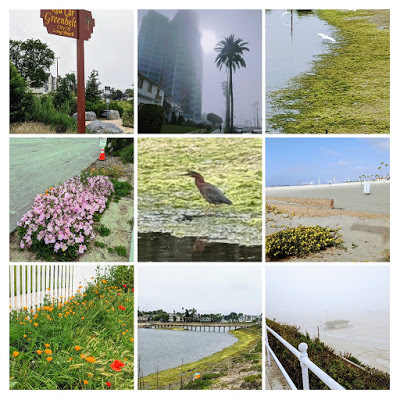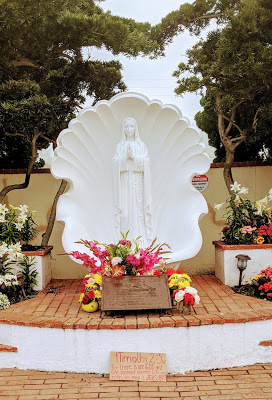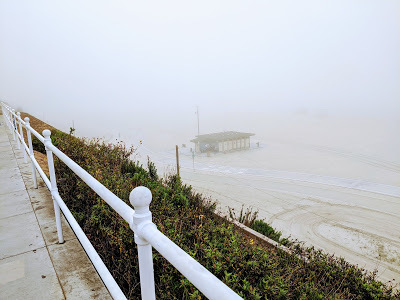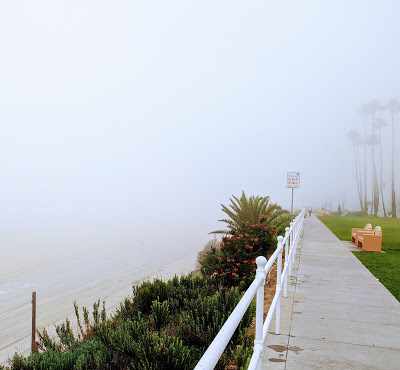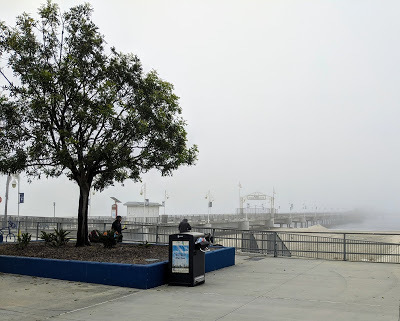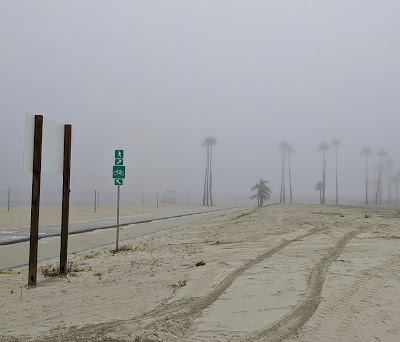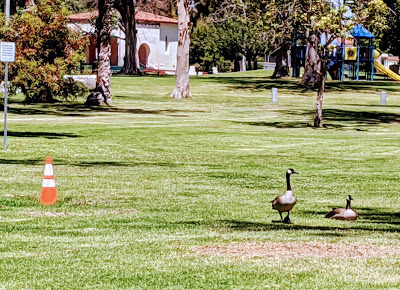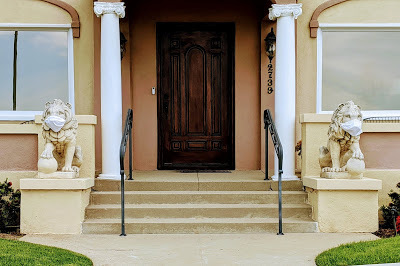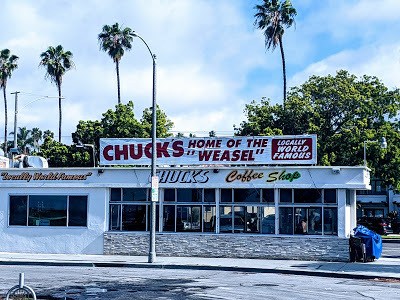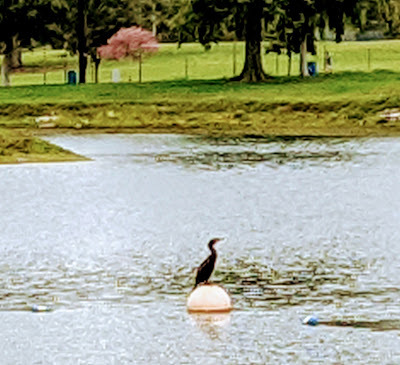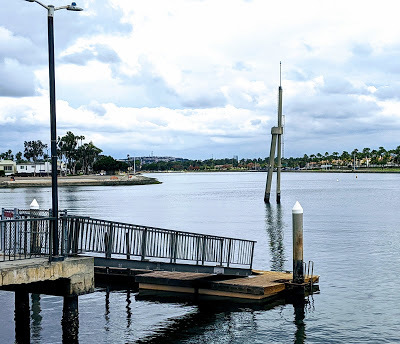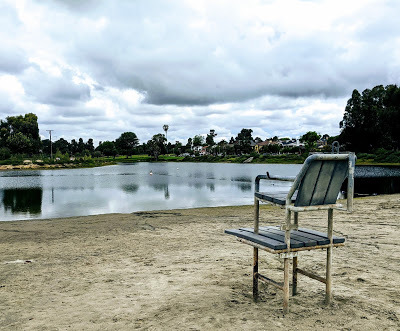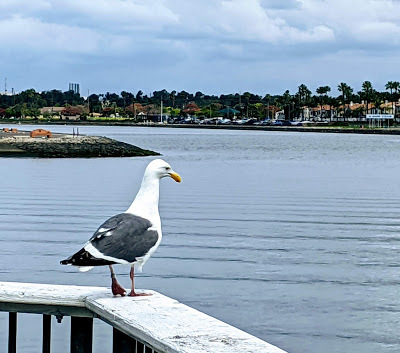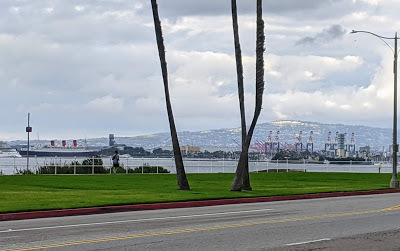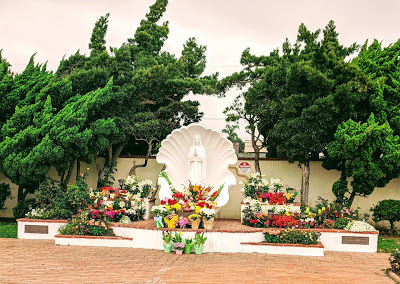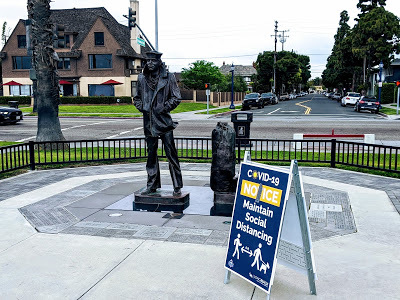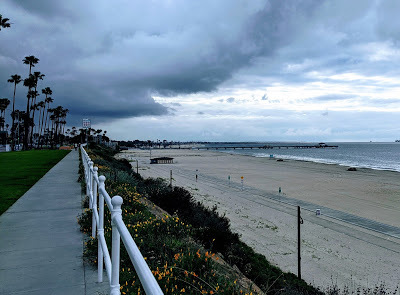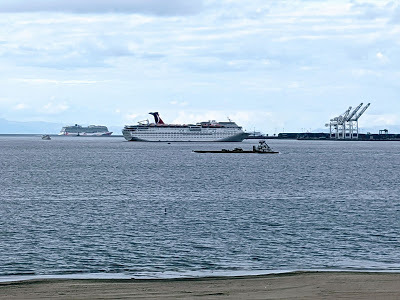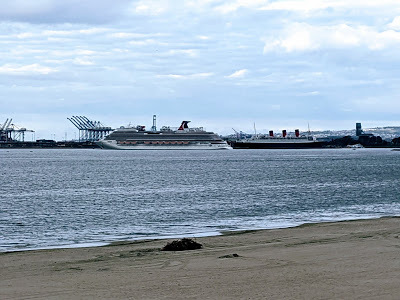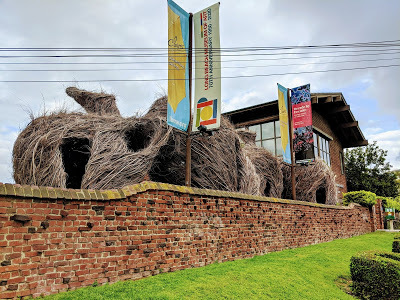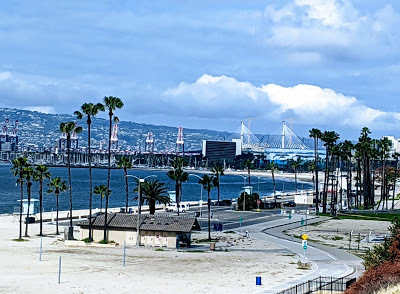R.L. Swihart's Blog, page 104
May 2, 2020
J. M. Synge's "In Wicklow and West Kerry"
It was the law at that time that if there was sickness on any person in the town of Sligo you should notice it to the Governors, or you'd be put up in the gaol. Well, a man's wife took sick, and he went and noticed it. They came down then with bands of men they had, and took her away to the sick-house, and he heard nothing more till he heard she was dead, and was to be buried in the morning. At that time there was such fear and hurry and dread on every person, they were burying people they had no hope of, and they with life within them. My man was uneasy a while thinking on that, and then what did he do, but slip down in the darkness of the night and into the dead-house, where they were after putting his wife. There were beyond twoscore bodies, and he went feeling from one to the other. Then I suppose his wife heard him coming—she wasn't dead at all—and "Is that Michael?" says she. "It is then," says he; "and, oh, my poor woman, have you your last gasps in you still?" "I have, Michael," says she; "and they're after setting me out here with fifty bodies the way they'll put me down into my grave at the dawn of day." "Oh, my poor woman," says he; "have you the strength left in you to hold on my back?" "Oh, Micky," says she, "I have surely." He took her up then on his back, and he carried her out by lanes and tracks till he got to his house. Then he never let on a word about it, and at the end of three days she began to pick up, and in a month's time she came out and began walking about like yourself or me. And there were many people were afeard to speak to her, for they thought she was after coming back from the grave.'
*
In these glens many women still wear old-fashioned bonnets, with a frill round the face, and the old men, when they are going to the fair, or to Mass, are often seen in curiously-cut frock-coats, tall hats, and breeches buckled at the knee. When they meet a wanderer on foot, these old people are glad to stop and talk to him for hours, telling him stories of the Rebellion, or of the fallen angels that ride across the hills, or alluding to the three shadowy countries that are never forgotten in Wicklow—America (their El Dorado), the Union and the Madhouse.
*
'I had a power of children,' an old man who was born in Glenmalure said to me once; 'I had a power of children, and they all went to California, with what I could give them, and bought a bit of a field. Then, when they put in the plough, it stuck fast on them. They looked in beneath it, and there was fine gold stretched within the earth. They're rich now and their daughters are riding on fine horses with new saddles on them and elegant bits in their mouths, yet not a ha'porth did they ever send me, and may the devil ride with them to hell!'
*
Everyone is used in Ireland to the tragedy that is bound up with the lives of farmers and fishing people; but in this garden one seemed to feel the tragedy of the landlord class also, and of the innumerable old families that are quickly dwindling away. These owners of the land are not much pitied at the present day, or much deserving of pity; and yet one cannot quite forget that they are the descendants of what was at one time, in the eighteenth century, a high-spirited and highly-cultivated aristocracy. The broken greenhouses and mouse-eaten libraries, that were designed and collected by men who voted with Grattan, are perhaps as mournful in the end as the four mud walls that are so often left in Wicklow as the only remnants of a farmhouse. The desolation of this life is often of a peculiarly local kind, and if a playwright chose to go through the Irish country houses he would find material, it is likely, for many gloomy plays that would turn on the dying away of these old families, and on the lives of the one or two delicate girls that are left so often to represent a dozen hearty men who were alive a generation or two ago. Many of the descendants of these people have, of course, drifted into professional life in Dublin, or have gone abroad; yet, wherever they are, they do not equal their forefathers, and where men used to collect fine editions of Don Quixote and Moliere, in Spanish and French, and luxuriantly bound copies of Juvenal and Persius and Cicero, nothing is read now but Longfellow and Hall Caine and Miss Corelli. Where good and roomy houses were built a hundred years ago, poor and tawdry houses are built now; and bad bookbinding, bad pictures, and bad decorations are thought well of, where rich bindings, beautiful miniatures, and finely-carved chimney-pieces were once prized by the old Irish landlords.
*
One wonders in these places why anyone is left in Dublin, or London, or Paris, when it would be better, one would think, to live in a tent or hut with this magnificent sea and sky, and to breathe this wonderful air, which is like wine in one's teeth.
Published on May 02, 2020 12:26
PLAGUE COLLAGE [5/2/20]
Published on May 02, 2020 12:18
April 25, 2020
Theological Differences
Published on April 25, 2020 12:42
FOG & FOGHORN: ON AND OFF THE BLUFFS [4.25.20]
Published on April 25, 2020 12:39
April 24, 2020
PLAGUE PALS [4.24.20]
Published on April 24, 2020 14:39
More "Rambles beyond Railways" (Clips)
Immense wealth of metal is contained in the roof of this gallery, throughout its whole length; but it remains, and will always remain, untouched. The miners dare not take it, for it is part, and a great part, of the rock which forms their only protection against the sea; and which has been so far worked away here, that its thickness is limited to an average of three feet only between the water and the gallery in which we now stand. No one knows what might be the consequence of another day's labour with the pickaxe on any part of it. This information is rather startling when communicated at a depth of four hundred and twenty feet under ground. We should decidedly have preferred to receive it in the counting-house! It makes us pause for an instant, to the miner's infinite amusement, in the very act of knocking away a tiny morsel of ore from the rock, as a memento of Botallack. Having, however, ventured on reflection to assume the responsibility of weakening our defence against the sea, by the length and breadth of an inch, we secure our piece of copper, and next proceed to discuss the propriety of descending two hundred and forty feet more of ladders, for the sake of visiting that part of the mine where the men are at work. Two or three causes concur to make us doubt the wisdom of going lower. There is a hot, moist, sickly vapour floating about us, which becomes more oppressive every moment; we are already perspiring at every pore, as we were told we should; and our hands, faces, jackets, and trousers are all more or less covered with a mixture of mud, tallow, and iron-drippings, which we can feel and smell much more acutely than is exactly desirable. We ask the miner what there is to see lower down. He replies, nothing but men breaking ore with pickaxes; the galleries of the mine are alike, however deep they may go; when you have seen one you have seen all.
*
Upon the whole, setting his successful and his disastrous speculations fairly against each other, the Cornish miner's average gains, year by year, may be fairly estimated at about ten shillings a week. "It's hard work we have to do, sir," said my informant, summing up, when we parted, the proportions of good and evil in the social positions of his brethren and himself—"harder work than people think, down in the heat and darkness under ground. We may get a good deal at one time, but we get little enough at another; sometimes mines are shut up, and then we are thrown out altogether—but, good work or bad work, or no work at all, what with our bits of ground for potatoes and greens, and what with cheap living, somehow we and our families make it do. We contrive to keep our good cloth coat for Sundays, and go to chapel in the morning—for we're most of us Wesleyans—and then to church in the afternoon; so as to give 'em both their turn like! We never go near the mine on Sundays, except to look after the steam-pump: our rest, and our walk in the evening once a week, is a good deal to us. That's how we live, sir; whatever happens, we manage to work through, and don't complain!"
*
Our walk from Botallack Mine to St. Ives, led us almost invariably between moors and hills on one side, and cliffs and sea on the other; and displayed some of the dreariest views that we had yet beheld in Cornwall. About nightfall, we halted for a short time at a place which was certainly not calculated to cheer the traveller along his onward way. Imagine three or four large, square, comfortless-looking, shut-up houses, all apparently uninhabited; add some half-dozen miserable little cottages standing near the houses, with the nasal notes of a Methodist hymn pouring disastrously through the open door of one of them; let the largest of the large buildings be called an inn, but let it make up no beds, because nobody ever stops to sleep there: place in the kitchen of this inn a sickly little girl, and a middle-aged, melancholy woman, the first staring despondently on a wasting fire, the second offering to the stranger a piece of bread, three eggs, and some sour porter corked down in an earthenware jar, as all that her larder and cellar can afford; fancy next an old, grim, dark church, with two or three lads leaning against the churchyard wall, looking out together in gloomy silence on a solitary high road; conceive a thin, slow rain falling, a cold twilight just changing into darkness, a surrounding landscape wild, barren, and shelterless—imagine all this, and you will have the picture before you which presented itself to me and my companion, when we found ourselves in the village of Morvah.
Published on April 24, 2020 14:27
April 22, 2020
Wilkie Collins: "Rambles beyond Railways"
Saw the OK series The Woman in White with my wife. Had heard of Wilkie Collins before (I believe C. S. Lewis mentioned him?) but, not being a mystery fan (and never talking to anyone who'd read him), I didn't look till now. And that's also certainly why I chose the sidebar of Rambles beyond Railways (it's about his "walking trip" in Cornwall in 1850).
*
Leaving Pistol Meadow, after gathering a few of the wild herbs growing fragrant and plentiful over the graves of the dead, we turned our steps towards the Lizard Lighthouse. As we passed before the front of the large and massive building, our progress was suddenly and startlingly checked by a hideous chasm in the cliff, sunk to a perpendicular depth of seventy feet, and measuring more than a hundred in circumference. Nothing prepares the stranger for this great gulf; no railing is placed about it; it lies hidden by rising land, and the earth all around is treacherously smooth. The first moment when you see it, is the moment when you start back instinctively from its edge, doubtful whether the hole has not yawned open in that very instant before your feet. This chasm—melodramatically entitled by the people, "The Lion's Den"—was formed in an extraordinary manner, not many years since. In the evening the whole surface of the down above the cliff was smooth to the eye, and firm to the foot—in the morning it had opened into an enormous hole. The men who kept watch at the Lighthouse, heard no sounds beyond the moaning of the sea—felt no shock—looked out on the night, and saw that all was apparently still and quiet. Nature suffered her convulsion and effected her change in silence. Hundreds on hundreds of tons of soil had sunk down into depths beneath them, none knew in how long, or how short a time; but there the Lion's Den was in the morning, where the firm earth had been the evening before. The explanation of the manner in which this curious landslip occurred, is to be found by descending the face of the cliff, beyond the Lion's Den, and entering a cavern in the rocks, called "Daw's Hugo" (or Cave). The place is only accessible at low water. Passing from the beach through the opening of the cavern, you find yourself in a lofty, tortuous recess, into the farthest extremity of which, a stream of light pours down from some eighty or a hundred feet above. This light is admitted through the Lion's Den, and thus explains by itself the nature of the accident by which that chasm was formed. Here, the weight of the upper soil broke through the roof of the cave; and the earth which then fell into it, was subsequently washed away by the sea, which fills Daw's Hugo at every flow of the tide. It has lately been noticed that the loose particles of ground at the bottom of the Lion's Den, still continue to sink gradually through the narrow, slanting passage into the cave already formed; and it is expected that in no very long time the lower extremity of the chasm will widen so far, as to make the sea plainly visible through it from above. At present, the effect of the two streams of light pouring into Daw's Hugo from two opposite directions—one from the Lion's Den, the other from the seaward opening in the rocks—and falling together, in cross directions on the black rugged walls of the cave and the beautiful marine ferns growing from them, is supernaturally striking and grand. Here, Rembrandt would have loved to study; for here, even his sublime perception of the poetry of light and shade might have received a new impulse, and learned from the teaching of Nature one immortal lesson more.
Published on April 22, 2020 10:17
April 21, 2020
Plague Pics: Masked Lions
Published on April 21, 2020 08:46
April 19, 2020
Without Lifting A Finger: Baudelairian "Clips"
Without Lifting A Finger: Baudelairian "Clips": From Paris Spleen : Life is a hospital, in which every patient is possessed by the desire of changing his bed. One would prefer to suffer...
Published on April 19, 2020 07:18
Plague PIcs: Around the Shore [4/17/20 & 4/18/20]
Published on April 19, 2020 07:16

